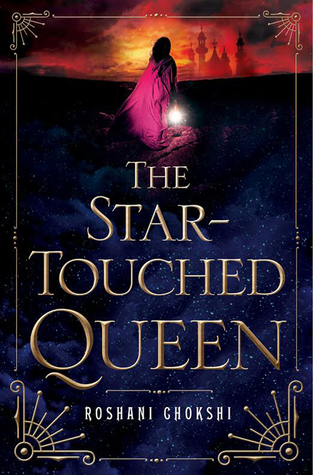Our word disaster comes from the Greek meaning “bad star.” And if one bad star portends calamity, imagine a whole sky of them.
Mayavati doesn’t have to. She is born with the most malignant horoscope the court has ever seen, and everyone from her father, the Raja, to the lowest girl in the harem knows that Maya is toxic. Her mere presence invites scorn and fearful whispers, and so she stays away, contenting herself with reading and eavesdropping on her father’s councils. Only her young half-sister Gauri wants anything to do with her, and that’s fine by Maya. Better a quiet life than a marriage that the stars insist will be cataclysmic.
A wedding is inevitable, though. Her father’s empire is at war, and she is needed for an alliance. But who, exactly, is the man who presents himself in the midst of bloodshed? And why does he promise her such delights, failing entirely to shrink from her fate like everyone else? What is he hiding, there in his magical kingdom with crystal gardens and empty halls? Maya will have to discover it for herself, and once she does, she’ll have to decide how far she’ll go to be with—or without—him.

While the overall story is a good one, I found certain elements of the plot a bit thin. Maya is supposedly a scholar and savvy political mind. Yet when she’s asked to give her life for her country (and why she’s told this I had no idea–an assassin is far more likely and reasonable), she acquiesces after a single idea–escape–fails? I can think of half a dozen alternate solutions, but she accepts her instructions as fate despite a lifetime struggling against the very idea of destiny. And surely someone so well versed in myths and fairy tales would know better than to pursue a mysterious voice and a cold, cold chill in a magical castle–especially after being warned against such things? It all seems a bit extreme and ill considered, indicating that the Almighty Plot (even when thin) is in charge here, not the characters. The ultimate effect is more like the moment when everyone splits up in a horror movie, and the cheerleader goes down the rickety basement steps. You just know something’s going to turn out badly. The tension isn’t so much from empathy with the character at that point, but simply from wondering what exactly is going to befall her–you’ve already written her off in your mind. Roshani Chokshi unfortunately falls victim to this trope from time to time, especially since she doesn’t create the most intuitive or straightforward narrative pacing.
The story rushes ahead and then falls behind, slowing to accommodate a romance but then glossing over critical details of motivation or background in the rush to create action. The prose is incredibly lush all the way through, and sometimes it disguises that unevenness, but not always. Chokshi certainly has a unique and compelling voice, but it needs more direction. Since she’s a first-time author I’m confident that she’ll find it, but in the meantime, her inexperience makes this a bit too bumpy or a bit too smooth.
In particular, the magic is a bit convenient and overpowered, though that does lend dramatic flair to scenes of conflict. It feels a great deal like Rosamund Hodge’s Cruel Beauty, which also features semi-sentient and dangerous house and a dangerously magical husband. Except that Amar isn’t all that dangerous. He’s the perfect gentleman, so much so that only his secrets keep him from feeling bland. Amar is also oddly paternal, taking it upon himself to teach Maya how to act via a series of tests. No matter how respectful he may be, this is not a relationship of equals. Amar has the power. Maya doesn’t take it from him, she earns it, reinforcing his position as superior for all that she wants to be his equal. To her credit, she eventually realizes this. However, she realizes it with the help of someone who is just as suspect and controlling as Amar. Overall, I don’t have a terribly favorable impression of Maya’s choices.
Chokshi shines when writing about the relationships between women. Maya, Gauri, and Mother Dhina are all compellingly portrayed, given depth and strength (except, in Maya’s case, when she’s around Amar). Even Kamala, a soulless flesh-eating demon, is a delight! Certain scenes between these ladies are practically sublime, and the setting of medieval/mythic India makes their interactions all the more exquisitely real and archetypally dramatic. They share bitterness and mistakes, and they ultimately find ways of grasping their own power.
Ultimately, I wanted to like this book more than I actually did. It has insight and excellent writing, and some scenes grasp the edges of perfection, so clear and complete that they might be archetypal. But the brilliance isn’t enough to save it from its own romance and pacing issues. I look forward to reading more from Chokshi, even the loose sequel to The Star-Touched Queen that comes out in a year (I hope it’s about Gauri).* But until then, it’s a good read over a weekend or vacation, but not a great one.
The Star-Touched Queen comes out on April 26.
*Edit: it is!
